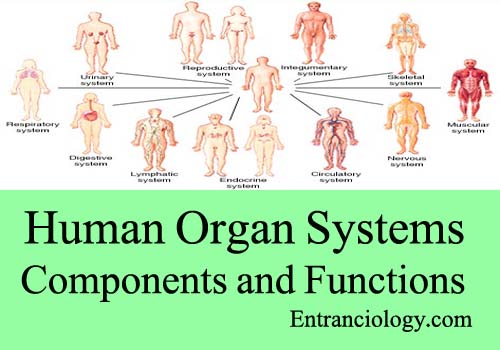
| S. No. | Name of Human Organ System | Components | Functions |
| 1 | Circulatory System | Blood, Heart, Blood Vessels, Lymph, Lymph Structures | It transports cells and chemical compounds throughout the body. |
| 2 | Digestive System | Mouth, Esophagus, Stomach, Intestine, Liver, Pancreas | It captures soluble nutrients from ingested food. |
| 3 | Endocrine System | Pituitary, Adrenal, Thyroid, Other Ductless Glands | It coordinates and integrates the activities of the body. |
| 4 | Immune System | Lymphocytes, Macrophages, Antibodies | It removes foreign bodies from the bloodstream; maintains homeostasis of the blood. |
| 5 | Integumentary System | Skin, Hair, Nails, Sweat Glands | It covers, and protects the body from various kinds of damages. |
| 6 | Muscular System | Skeletal muscle, cardiac muscle, smooth muscle | It produces body movement |
| 7 | Nervous System | Nerves, sense organs, brain, spinal cord | It receives stimuli, integrates information, and directs the body. |
| 8 | Reproductive System | Testes, Ovaries, Associated Reproductive Structures | It carries out reproduction |
| 9 | Respiratory System | Lungs, Trachea, Other air passages | It captures Oxygen and conducts gaseous exchange. |
| 10 | Skeletal System | Bones, Cartilage, Ligaments | It protects the body and provides support for locomotion and movement |
| 11 | Urinary System | Kidney, Bladder, Associated Ducts | It removes metabolic wastes from the bloodstream. |


